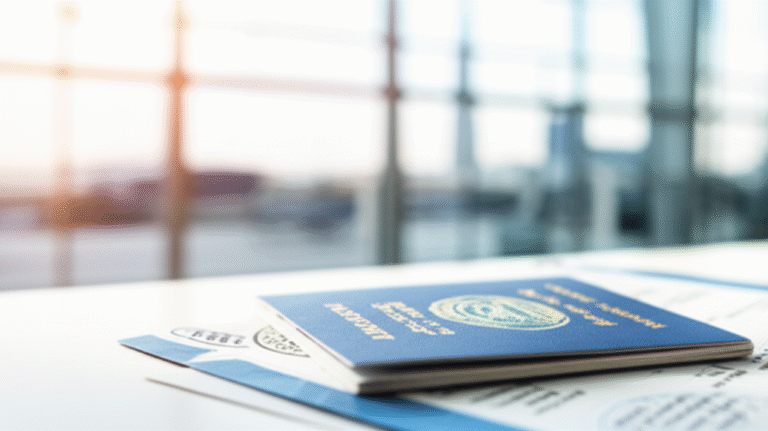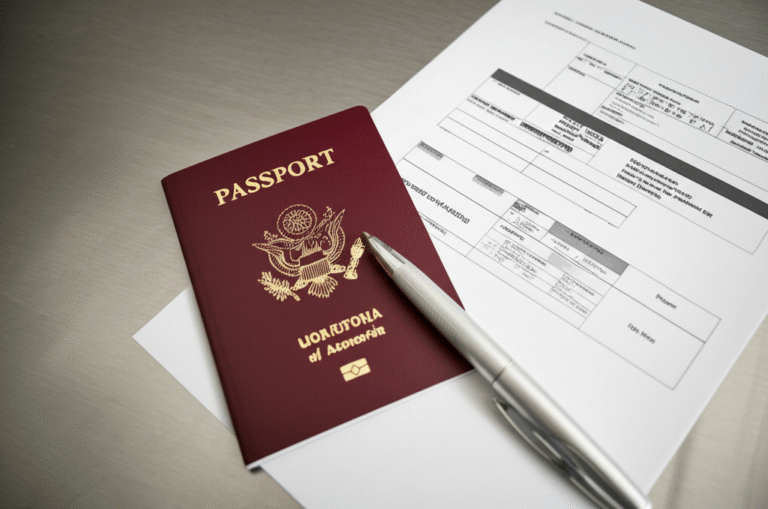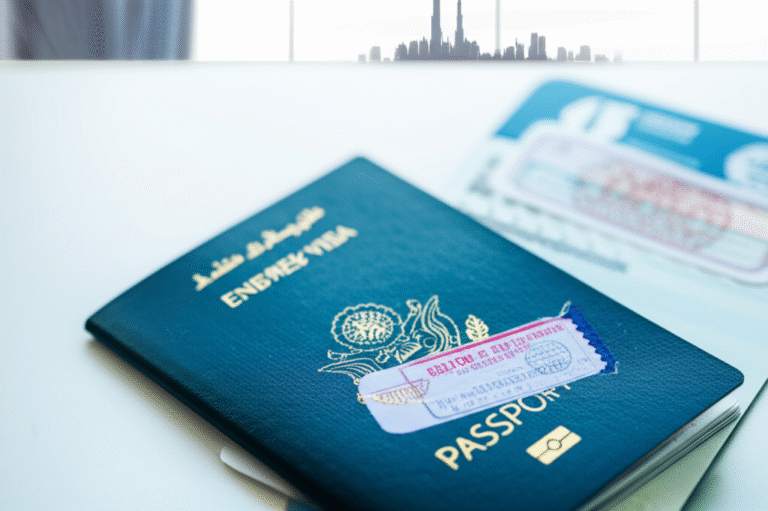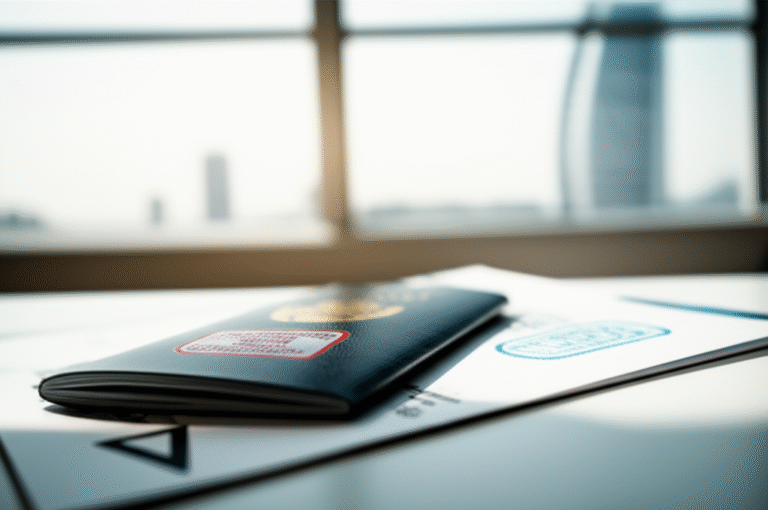How To Get Korean Visa In Dubai: Quick Guide
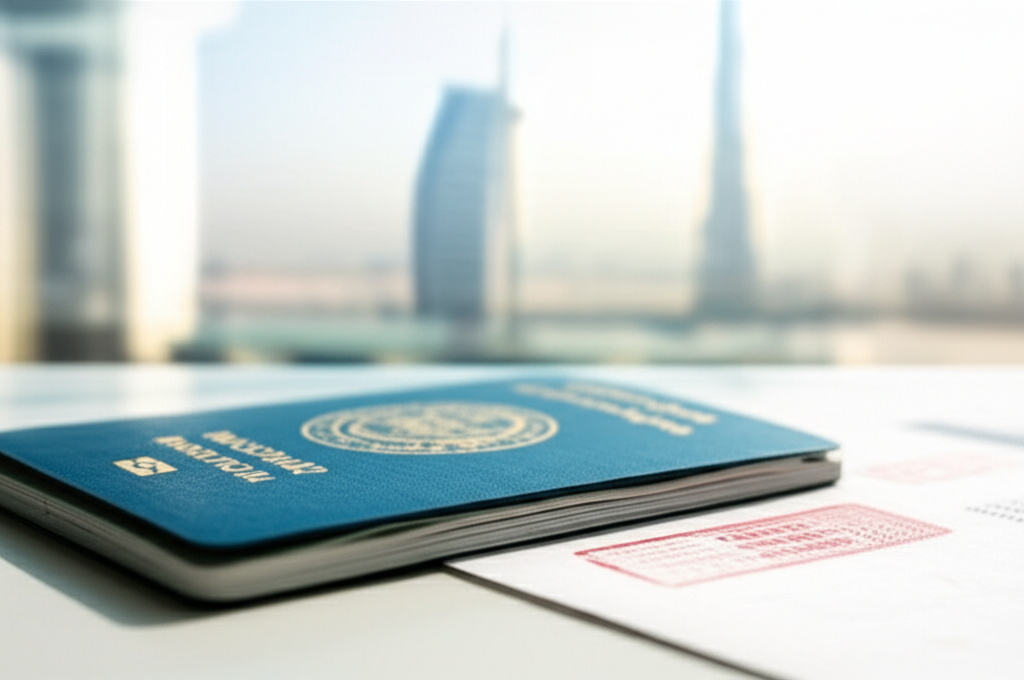
Embarking from Dubai to South Korea for tourism, business, or study? This guide simplifies how to get your Korean visa in Dubai. Discover the essential steps, required documents, and helpful tips for a smooth application process, ensuring your journey to the Land of the Morning Calm begins with confidence and ease.
Key Takeaways
- Understand visa types for your purpose.
- Gather all required official documents meticulously.
- Schedule an appointment at the Korean Embassy or Consulate.
- Submit your application and pay the visa fee.
- Track your visa application status diligently.
Planning a trip from Dubai to South Korea can be an exciting prospect. Whether you’re drawn by the vibrant culture, delicious cuisine, or cutting-edge technology, the process of obtaining a Korean visa might seem a bit daunting. If you’re a resident, expat, or even a visitor in Dubai looking to visit South Korea, you’re likely wondering about the specific steps involved. Navigating visa applications can sometimes feel complex, but it doesn’t have to be. We’re here to break down the entire process for how to get a Korean visa in Dubai, making it clear and manageable. Get ready to prepare your documents and understand each step with this comprehensive guide.
Understanding Korean Visa Requirements for Dubai Residents
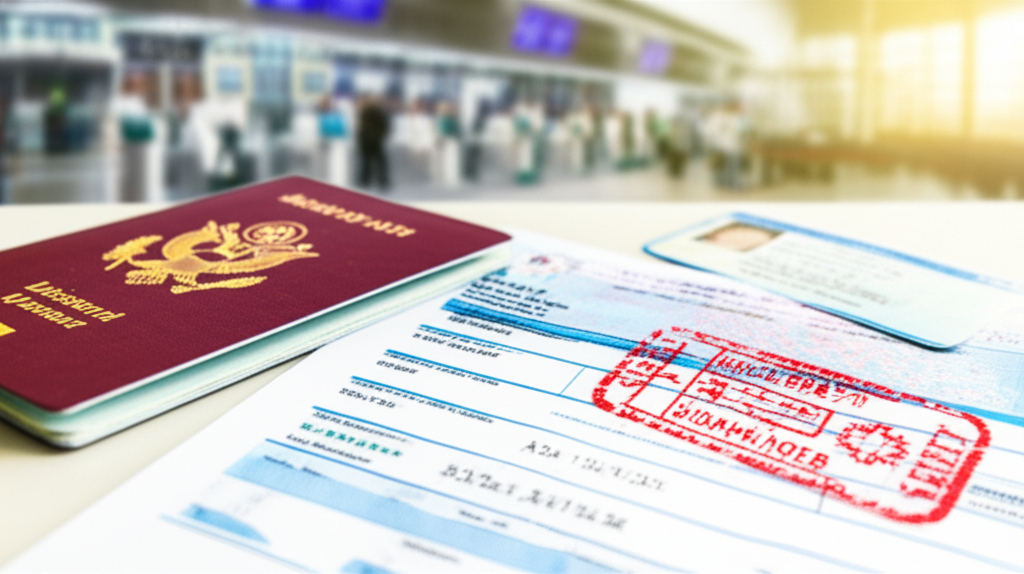
South Korea offers a fascinating blend of ancient traditions and futuristic advancements, making it a popular destination for travelers from the UAE. For residents in Dubai, securing a Korean visa involves understanding the different categories available and ensuring all documentation is in order. The Korean Embassy in the UAE is your primary point of contact for this process, and their requirements are designed to be thorough yet straightforward when followed correctly.
The type of visa you need depends entirely on the purpose of your visit. Are you planning a short holiday, attending a business meeting, or enrolling in an academic program? Each scenario has a specific visa category with its own set of documentation and application procedures. It’s crucial to identify the correct visa type early in your planning phase to avoid any last-minute complications. This foundational step ensures you are on the right track to successfully obtaining your Korean visa from Dubai.
Common Korean Visa Types for UAE Residents
When you decide to travel to South Korea from Dubai, the first step is to determine which visa category best suits your travel purpose. The Korean Embassy in Abu Dhabi (which handles visa applications for residents of Dubai and the Northern Emirates) offers several visa types. Understanding these will help you prepare the correct documents and application.
1. Tourist Visas (Short-Term Visas)
These are the most common types for individuals visiting South Korea for tourism, visiting friends or family, or short business trips (like attending conferences or exploring business opportunities, not for employment). The duration of stay usually ranges from 90 days or less.
- C-3-1: For general tourism.
- C-3-2: For visiting relatives.
- C-3-4: For short-term business meetings or commercial activities.
2. Study Visas
If you plan to pursue academic studies, language courses, or research programs in South Korea, you will need a study visa. This category is often more detailed and requires proof of acceptance from a South Korean educational institution.
- D-2: Visa for students pursuing a regular degree program (Bachelor’s, Master’s, PhD).
- D-4: Visa for students undertaking a training program, language course, or other preparatory studies.
3. Work Visas
For those intending to work in South Korea, specific work visas are required. These are typically sponsored by a South Korean employer and involve a more complex application process, often initiated by the employer in Korea.
- E-series visas: Cover various types of employment, such as E-2 for English language instructors or E-7 for professionals with specialized skills.
4. Other Visa Categories
South Korea also offers visas for cultural and artistic activities (C-4), visiting family members of Korean nationals (F-series), and more. Always check with the Embassy to confirm the appropriate visa for your specific situation.
Choosing the correct visa type is paramount. An incorrect selection could lead to your application being rejected. For instance, a business visitor visa (C-3-4) might not be suitable if you intend to engage in any form of paid work.
Essential Documents for Your Korean Visa Application from Dubai
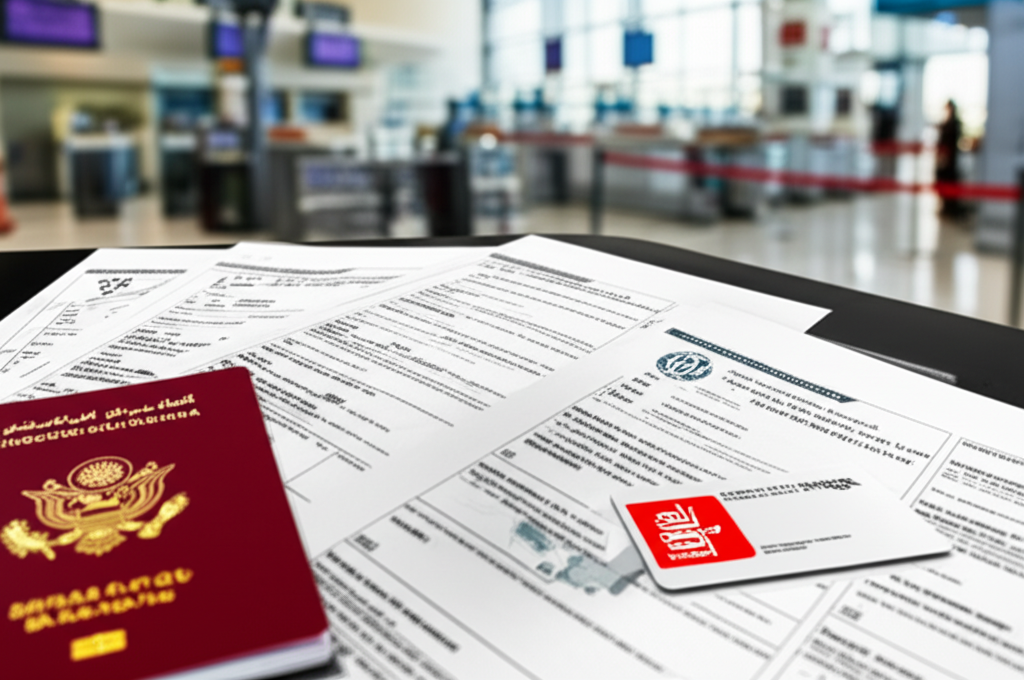
Preparing the necessary documents is a critical step in the Korean visa application process. The Korean Embassy in Abu Dhabi requires a comprehensive set of papers to verify your identity, financial stability, and the purpose of your visit. While requirements can vary slightly based on the visa type, here’s a general list of documents you will likely need:
General Documents (Applicable to most visa types)
- Completed Visa Application Form: Downloadable from the Korean Embassy’s website. Ensure all sections are filled accurately and honestly.
- Passport: Original passport valid for at least six months beyond your intended stay in South Korea, with at least two blank pages. A copy of the passport’s bio-data page is also usually required.
- Passport-Sized Photographs: Recent photos (usually two) meeting specific requirements (e.g., white background, specific dimensions).
- Visa Fee: Paid in the prescribed currency and method.
- Proof of Residency in the UAE: A copy of your Emirates ID and UAE residence visa.
Documents Specific to Visa Type
These documents will add weight to your application and prove your eligibility for the specific visa you are applying for.
- For Tourist Visas (C-3-x):
- Cover Letter: Stating your visit purpose, duration, and itinerary.
- Flight Bookings: Round-trip flight reservations.
- Hotel Reservations: Proof of accommodation.
- Financial Documents:
- Original Bank Statement for the last 3-6 months, showing sufficient funds to cover your trip. This statement should be stamped and signed by the bank.
- Letter from your Employer on company letterhead, stating your position, salary, duration of employment, and approved leave of absence. If self-employed, provide business registration documents and financial statements.
- For Visitors to Relatives/Friends: Invitation letter from the host in Korea and a copy of their Korean ID or passport.
- For Study Visas (D-2, D-4):
- Admission Letter from the South Korean institution.
- Academic Documents: Transcripts, diplomas, certificates.
- Proof of Financial Support: Bank statements or sponsorship letters to cover tuition and living expenses.
- Study Plan.
- For Work Visas (E-series):
- Employment Contract.
- Certificate of Business Registration of the sponsoring company.
- Various supporting documents depending on the specific job and visa type.
It is highly recommended to visit the official website of the Embassy of the Republic of Korea in the UAE for the most up-to-date and detailed list of required documents for each visa category. Sometimes, additional documents may be requested based on individual circumstances.
Step-by-Step Guide: How to Get Your Korean Visa in Dubai
Navigating the visa application process from Dubai to South Korea can be made simple by following a structured approach. The Korean Embassy in the UAE is the official body that processes these applications. Here’s a detailed breakdown of the steps you need to take:
Step 1: Determine Your Visa Type
As discussed earlier, identify the correct visa category that matches your travel purpose (tourism, business, study, etc.). This is the most crucial first step. Incorrectly identifying your visa type can lead to delays or rejection.
Step 2: Check Eligibility and Requirements
Visit the official website of the Embassy of the Republic of Korea in the UAE. Look for the visa section to find detailed information on eligibility criteria and the specific documents required for your chosen visa type. Pay close attention to any updates or special instructions.
Embassy of the Republic of Korea in the UAE
Step 3: Gather All Necessary Documents
Collect all the documents listed for your specific visa category. Ensure they are authentic, complete, and meet the Embassy’s specifications (e.g., passport validity, photo size, bank statement details). It’s wise to make photocopies of all submitted documents for your records.
Pro Tip: Always ensure your bank statements are official, stamped, and signed by the bank. Incomplete or unofficial financial documents are a common reason for visa rejection.
Step 4: Schedule an Appointment
Most embassies require applicants to schedule an appointment before visiting. This helps manage the flow of applicants and reduces waiting times. Check the Embassy’s website or contact them directly to understand their appointment booking procedure. Some might use an online booking system, while others might rely on phone calls or emails.
Step 5: Submit Your Application
On your scheduled appointment date, visit the Korean Embassy in Abu Dhabi (or their designated visa application center, if applicable). Submit your completed application form along with all supporting documents. Be prepared to answer any questions the consular officer might have.
Embassy of the Republic of Korea in the UAE:
Villa No. 25, Street No. 3, Sector 2-2, Off Airport Road, P.O. Box 5077, Abu Dhabi, UAE.
Step 6: Pay the Visa Fee
The visa fee must be paid at the time of application submission. The fee amount varies depending on the visa type and the duration of your stay. Check the Embassy’s website for the current fee structure. Payment methods usually include cash or bank transfer, so confirm this beforehand to avoid issues.
Step 7: Track Your Application Status
After submission, you will usually be given a receipt or tracking number. Use this to monitor the status of your visa application online via the Embassy’s portal or by contacting them directly. Processing times can vary, so it’s advisable to apply well in advance of your planned travel date.
Step 8: Collect Your Passport and Visa
Once your visa is approved, you will be notified to collect your passport from the Embassy. Upon collection, carefully check the visa details to ensure everything is accurate. If there are any discrepancies, report them immediately.
Applying in person at the Embassy is the standard procedure. Make sure you adhere strictly to the dress code and conduct expected at the Embassy premises.
Visa Processing Times and Fees
Understanding the timelines and costs associated with your Korean visa application is essential for planning. These elements can significantly impact your travel arrangements and budget.
Visa Processing Times
The time it takes to process a Korean visa application can vary. Generally, for short-term visas like tourist visas, processing can take anywhere from 5 to 15 working days. However, this is an estimate, and it can be longer during peak seasons or if your application requires further review or additional documentation.
Study visas and work visas typically have longer processing times, often ranging from 30 days to several weeks, as they involve more complex assessments and often coordination with relevant authorities in South Korea.
It’s always best to apply for your visa at least 1-2 months before your intended departure date to allow ample time for processing, potential delays, or follow-up requests from the Embassy.
Visa Fees
The cost of a Korean visa varies based on the visa type and duration of stay. Fees are subject to change, so it’s crucial to verify the exact amount with the Embassy of the Republic of Korea in the UAE. As of recent information, here are some approximate fee ranges:
| Visa Type | Approximate Fee (AED) | Notes |
|---|---|---|
| Short-Term Tourist Visa (Single Entry, up to 90 days) | 150 – 250 | Subject to change. May vary based on nationality and duration. |
| Short-Term Business Visa (C-3-4) | 150 – 250 | Similar to tourist visa fees. |
| Long-Term Visas (Study, Work, etc.) | 200 – 400+ | Fees can be significantly higher and depend on the specific E or D visa category. |
Important Note on Fees: Visa fees are typically non-refundable, even if your application is denied. Always confirm the payment method (cash, bank transfer) and the exact amount with the Embassy before your appointment.
It’s also worth noting that some nationalities might be exempt from visa fees for short-term stays under specific agreements. Always check the latest guidelines from the Embassy.
Tips for a Smooth Korean Visa Application from Dubai
To ensure your journey from Dubai to South Korea is as seamless as possible, here are some additional tips to help you navigate the visa application process effectively. These are based on common practices and potential pitfalls noted in visa processing:
- Apply Well in Advance: Do not wait until the last minute. Start your application process at least 6-8 weeks before your intended travel date. This buffer accounts for potential delays, document issues, or the need for additional information.
- Accuracy is Key: Double-check all information provided on your application form and supporting documents. Any discrepancies or errors, no matter how minor, can lead to rejection or significant delays.
- Use Official Sources: Rely solely on information from the Embassy of the Republic of Korea in the UAE’s official website or by contacting them directly. Third-party websites may provide outdated or incorrect information.
- Financial Proof: Ensure your bank statements clearly show consistent income and sufficient funds. A sudden large deposit just before applying might raise suspicion. If your employer is sponsoring your trip, ensure their financial documents are equally robust.
- Clear Itinerary: For tourist visas, a well-planned itinerary including flight bookings, hotel reservations, and planned activities makes your purpose of visit more concrete and believable.
- Honesty is the Best Policy: Never provide false information or counterfeit documents. This can lead to immediate rejection and potentially a ban from entering South Korea in the future.
- Prepare for the Interview (if any): While not always mandatory for all visa types, be prepared to answer questions about your trip, your financial situation, and your ties to the UAE if called for an interview.
- Keep Copies: Make copies of your application form, passport, visa, and all supporting documents. This is useful for your records and in case of any issues during your travel.
- Understand Specific Country Requirements: If you are not a UAE national but a resident holding a different country’s passport, you might have specific additional requirements. Verify these with the Embassy.
By following these practical tips, you can significantly increase your chances of a successful Korean visa application from Dubai, allowing you to focus on the exciting aspects of your upcoming trip.
Frequently Asked Questions (FAQs) about Korean Visas from Dubai
Here are some common questions that residents in Dubai often have when seeking a Korean visa. We’ve provided clear, beginner-friendly answers to help you navigate the process with confidence.
Q1: Do I need a visa to visit South Korea if I am a UAE resident?
A1: Yes, generally, UAE residents (including expatriates and GCC nationals who are not Korean citizens) will need a visa to enter South Korea for tourism, business, or other purposes, unless they fall under specific visa exemption agreements for certain nationalities which are rare for long-term stays. Always confirm with the Embassy.
Q2: Where can I apply for a Korean visa in the UAE?
A2: All Korean visa applications for residents of Dubai and the Northern Emirates are processed by the Embassy of the Republic of Korea, located in Abu Dhabi. Some visa types might be handled through authorized visa application centers, so check the Embassy’s official website for current procedures.
Q3: How long does it take to get a Korean visa?
A3: Processing times typically range from 5 to 15 working days for short-term visas. However, it can take longer for long-term visas or during peak application periods. It’s recommended to apply at least 1-2 months before your planned departure.
Q4: What if my visa application is rejected? Can I reapply?
A4: If your visa application is rejected, you will usually be given a reason. You are generally allowed to reapply after addressing the reasons for the initial rejection by providing additional documentation or clarifying information. It’s advisable to understand the specific reasons for rejection before reapplying.
Q5: Can I apply for a Korean visa online from Dubai?
A5: Currently, the primary method for applying for a Korean visa from Dubai involves submitting your application and documents in person at the Embassy of the Republic of Korea in Abu Dhabi, often after scheduling an appointment. Some specific visa types or nationalities might have exceptions or use online systems for certain parts of the process, so always check the official Embassy website for the most current information.
Q6: What is the validity of a Korean tourist visa?
A6: Short-term Korean tourist visas (C-3-1, C-3-2, C-3-4) are typically valid for single entry for a period of up to 90 days. The visa itself will indicate the period of validity within which you must enter South Korea. The duration of stay allowed is usually stated on the visa sticker.
Q7: Do I need to show proof of onward travel?
A7: Yes, for tourist visas, proof of onward travel, such as confirmed return flight tickets, is usually a mandatory requirement. This demonstrates your intention to leave South Korea within the permitted visa duration.
Conclusion
Obtaining a Korean visa from Dubai is a well-defined process that requires careful preparation and attention to detail. By understanding the various visa types, meticulously gathering the necessary documents, and following the step-by-step application procedure at the Embassy of the Republic of Korea, you can significantly streamline your journey. Remember that clear communication with the Embassy and adherence to their guidelines are key to a successful application. With this comprehensive guide, you are now better equipped to plan your trip to South Korea, ensuring your travel experience from Dubai is both exciting and stress-free.

